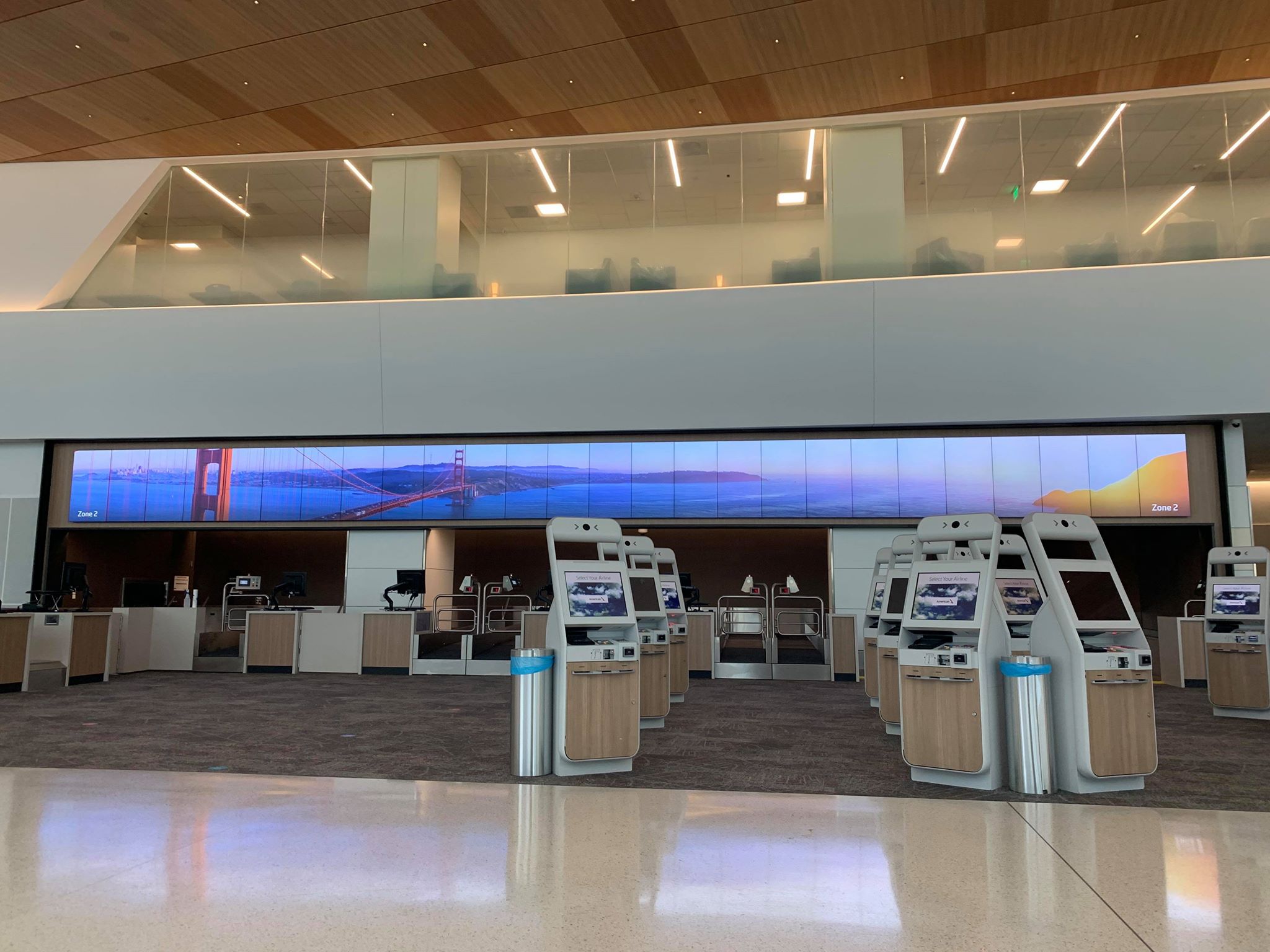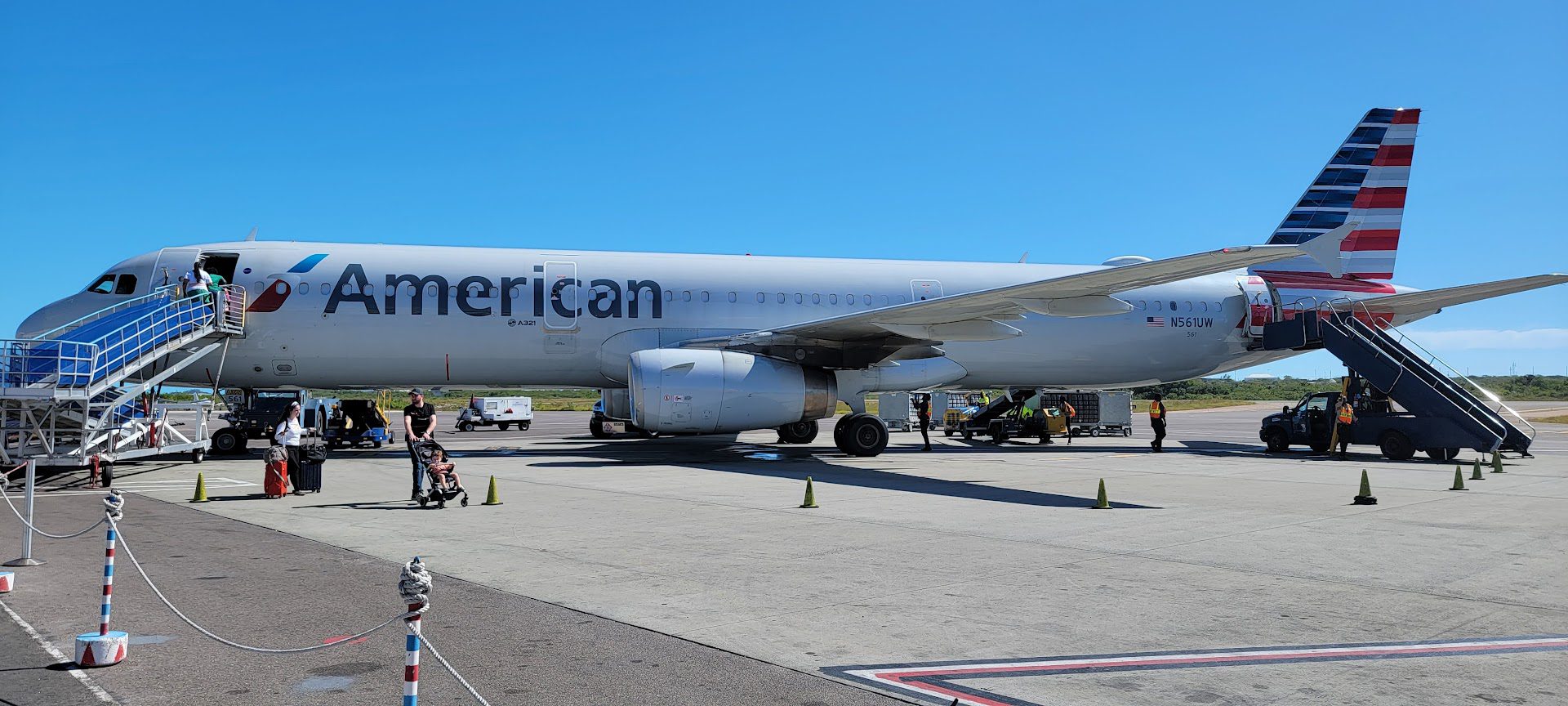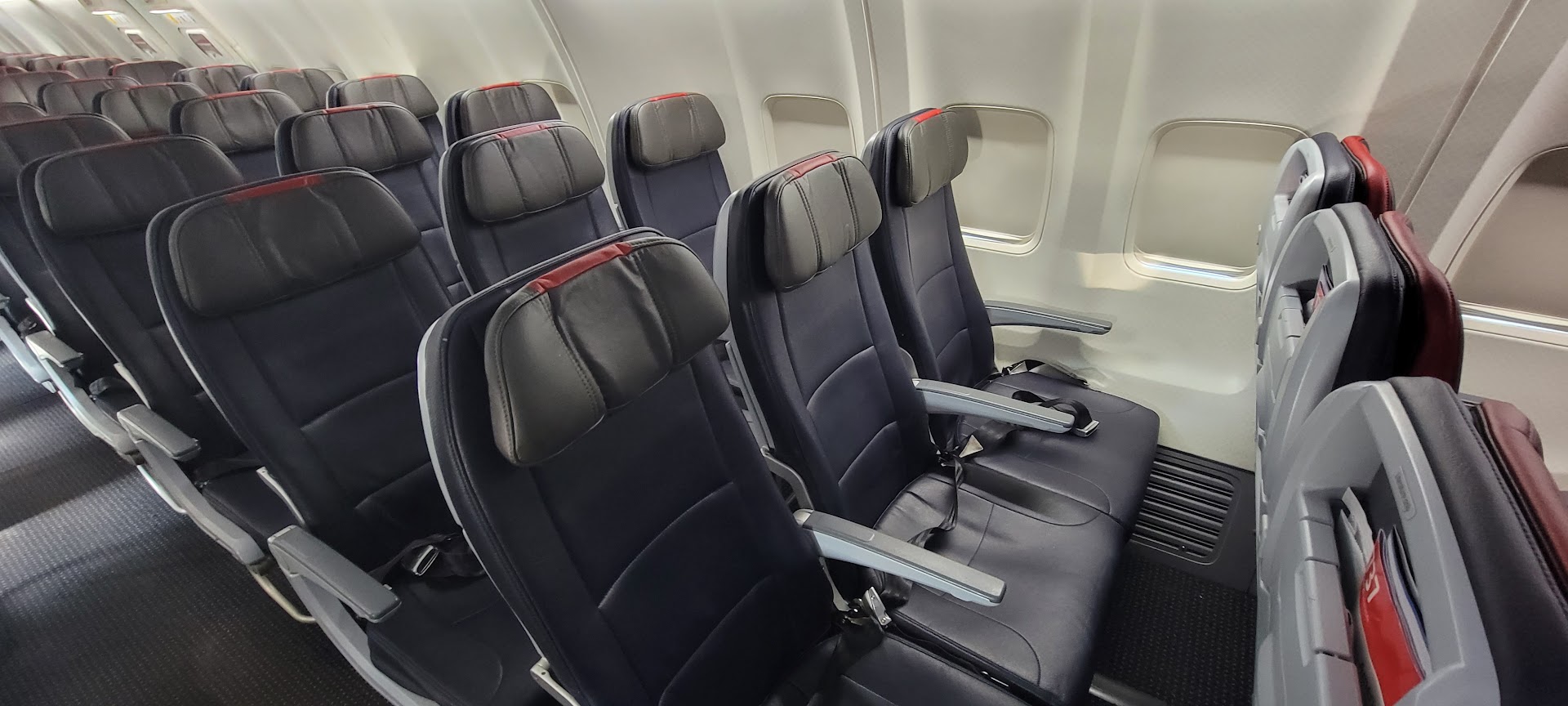An American Airlines passenger flying from Nassau to Miami was arrested and spent about a week in a Bahamian jail for smuggling drugs in her checked bag. Except she didn’t check any bags – it appears that an employee checked it in her name.
Alison Dominguez, who flew roundtrip from Miami over a short weekend in April, was carry-on only.
- She checked in online about 12:30 pm
- Arrived at the airport about 4:40 pm
- Used TSA PreCheck and Global Entry for immigration preclearance
- And was waiting in the lounge for her 6:36 p.m. departure

She was summoned to the gate at 5:10 p.m. where two U.S. Customs agents and an American employee showed her a bag that the airline labeled as hers (the tag showed her name). She denied every seeing or possessing that bag. It contained more than 100 bottles of codeine.
Her lawsuit alleges that an American Airlines employee at the airport checked the drug‑filled bag under a real passenger’s name. With U.S. immigration preclearance at Nassau, there’s no customs in the U.S. making it easy for an accomplice could retrieve the bag from domestic baggage claim in Miami.
She was arrested and “spent almost a week imprisoned under horrific conditions” which she describes as:
- sleeping on a concrete floor soiled with urine and feces,
- periods without bathroom access,
- a threatened rape by a male inmate, and
- being told by guards she might have been exposed to AIDS.

The pleading says American did nothing to assist during confinement and failed to verify obvious inconsistencies – the bag was checked in before she arrived at the airport, which she was eventually able to use to exonerate herself.
She’s arguing negligence, including the failure to safeguard personal information and baggage systems; failure to warn about insider drug smuggling risks that American previously identified; defamation by making false claims to airport, customs, and Bahamian authorities; and false imprisonment by instigating and procuring her arrest.

American has had actual knowledge of prior smuggling arrests tied to airline staff and American has demonstrated awareness and taken steps to address this, supporting a duty and continued negligence theory. They falsely identified her as the bag’s owner and caused law enforcement to act against her, and she experienced both bodily injury and significant emotional distress during her confinement.
The airline will almost certainly argue,
- Montreal Convention pre-empts state damages claims as the exclusive remedy for personal injury if caused by an “accident” that occurred on board or in the course of embarkation or disembarkation. They’ll claim the relevant “accident” – the bag’s false association and subsequent law‑enforcement handoff – occurred during embarkation and the complaint pleads physical injury, so the Montreal Convention governs the claim.
She’ll (correctly, I think) respond that the foreign imprisonment unfolded off‑airport and after any embarkation; defamation and false imprisonment are hardly classic Montreal Convention claims – that’s supposed to be for airline accidents; and false reporting criminal misconduct is not a mishap of carriage.
- Airline Deregulation Act pre-empts state damages claims since state law can’t regulate an airline’s services and that in the Eleventh Circuit (which includes Florida), “services” are read broadly to include boarding and baggage handling. American will argue the negligence is “related to … [baggage] services” so state law is pre-empted.
Surely, though, false reporting of criminal acts is not a ‘service’ an airline provides or competes on, and that personal‑injury negligence claims rooted in safety (as opposed to pricing, schedules, or marketing) typically escape Airline Deregulation Act preemption.
- Statutory immunity for reports to U.S. authorities about suspected criminal activity, under the Aviation and Transportation Security Act, unless the report was materially false. Immunity covers reports to U.S. federal, state and local officers. It’s not clear to me whether it covers foreign authorities – perhaps some subject matter experts among readers can weigh in? Immunity disappears if the statements were materially false or misleading, which seems to be the case here.
- It’s law enforcement that arrested her, not American. This breaks the chain of causation. The plaintiff will say that American ‘instigated’ the arrest, and that but‑for their false identification there would have been no arrest. Where arrests are procured or directed by a private individual or corporation, they become actionable.
- No vicarious liability for an employee’s drug smuggling, and that their checking the bag in the plaintiff’s name was outside the scope of employment. However the filing targets Americans systems, supervision and communication, not the actual smuggling employee’s actions.

There will likely be some forum disputes as well, since the filing is in Florida, American is based in Texas, and the conduct occurred in Nassau.
Ultimately I think this comes down to the extent to which the airline was negligent, and that this negligence led to their making false reports to authorities, because the bag was checked in under the passenger’s name prior to her arriving at the airport (but after she’d checked in electronically). And this reveals an interesting wrinkle and risk in app-based check-in that hadn’t occurred to me previously.
What do you think, does American Airlines get the blame here – and the liability?
(HT: Johnny Jet)


I’ve always had my ID checked when checking a bag on any carrier. How could AA accept a random bag under any name… then, again, maybe they have been acquired by Hertz, whien I wasn’t looking.
I love when Gary plays lawyer. Did you ever want to be a lawyer?
False accusations, maybe to the point of gross negligence, leading to defamation and wrongful imprisonment, sure sound like ‘damages’ to me.
Why not sue? (Ideally, someone or something with ‘deep pockets’), whether it’s the airline or whichever government(s) are responsible, and (eventually) collect. At least the lawyers may win their fees… *sigh*
Speaking of, I’d like to think Dr. Dao is out there (hopefully somewhere nice) enjoying his large cash settlement…
I would hope they’d have security cameras in the check-in area. Since they knew the timestamp when the bag tag was generated, it shouldn’t be hard to check the cameras at that time and see what was happening at the desks and whether the bag belonged to her. She probably should never have been arrested.
I’ve also been curious for as long the program’s existed exactly how pre-clearance works. Those are US LE officers operating on foreign soil, and you’ll notice she ended up in a Nassau jail… how does that work, exactly? Was she arrested by US officers for violating Nassau law? Which law(s), and how did they know? Where, exactly, was custody transferred? What are her rights? Does the US state have the same duties toward citizens on foreign soil?
American is likely at fault but almost certainly will escape any liability due to the various laws and regulations you stated. On the other hand they could also negotiate a small “go away” payment to avoid court cost and more publicity which, IMHO, would be a prudent course of action.
I’m a bit confused she was flying from Nassau but what lounge was she in? Presumably this could happen to anyone. Hope she gets a nice settlement. If it can be proved that an AA employee checked in this bag in her name I would think AA would be liable.
Someone generated the bag tag. That tracking Alon’s should be the start point.
I’d figure the $$$$ award on this one should be significant enough for impact on an earnings call. Way too many at fault actors.
The problem with these proposed American Airlines defenses is that American’s negligence, committed by AA employees and made possible by AA’s negligent procedures, was committed on the ground before she even arrived at the airport and was in no way related to any travel services AA provided to her (or likely anybody). That she happened to be traveling when AA’s negligence caused her damages is purely incidental. If AA had tampered with her own checked bag, I think the result would be different because it would then be related to an actual travel service. I certainly hope AA losses and is incentivized to make sure that it’s personnel, procedures, and facilities can no longer harm innocent people.
Wow. 5000 Aadvantage miles is not going to make THIS go away. Hope she gets multiple 7-figures.
Clearly the airline is at fault. If you’re not physically there to check your baggage. They should’ve seen this as suspicious.
Would airline personnel have immediate access to security camera footage? If not, how would they know she arrived at the airport after the bag was checked? There’s nothing inherently unreasonable or negligent about seeing “bag checked at X o’clock” and thinking the passenger was present – that’s the norm. Responsibility resides with those who did have immediate access to such evidence and chose not to utilize it.
Just another reason to have all airline apps on your phone, since most (including AA, I believe) include tracking bags. I know with other airlines, the movement of the bag triggers notifications to the app “Your bag has been checked-in” “Your bag has been loaded”……
As for AA in this case, they would be best suited to quietly settle this case prior to it seeing any court room—because this cannot be the first time, nor will it likely be the last time (unless they change their systems) this occurs.
Yes, she will hire a lawyer to take AA to the cleaners, er. to court. And they deserve it. And for those who will knee jerk state that lawyers are the scum of the earth, may you be consigned to fly AA in basic economy for the rest of your lives.
To Mike, who says Gary’s just playing lawyer here: Well, Mike (and also Gary), here are four points for you. First, aviation tort law is a very technical specialty that most lawyers remain 100% ignorant of; second, the Montreal convention does not protect against gross negligence (always hard to prove, by the way); third, the Montreal convention also does not shield the airline from claims resulting from intentional employee misconduct; and fourth, I suppose it doesn’t shield claims involving out-sourced ground-handling (a/k/a independent contractors) either, assuming out-sourcing happened here. Then there’s also the obvious point that sometimes the PR posture of a claim trumps all that technical legal stuff anyway. Oh, and by the way, I’m not an aviation specialist either … so you can ignore everything I just said!
@ Mike — No, but he did stay at a Holiday Inn Express last night.
Making false statements in reckless disregard for their truth or falsity is actionable.
If it’s true American Airlines knew they had an ongoing problem with American Airlines’ airport personnel smuggling bags to the United States under innocent passenger names, then American Airlines would be liable, because American Airlines had a duty to disclose this fact
Making an incorrect police report you honestly in good faith believe to be correct is privileged conduct. But making a police report you claim to be true, which, in fact, you secretly have reason to believe could be false, without disclosing that reason, is making a police report in reckless disregard for its truth or velocity.
I am a tiny unprofitable shareholder of AA, still holding out hope it can become the airline I knew it to be in the age of Crandall. This story, perhaps being female myself, and feeling for the victim of this nightmare being held in horrible conditions and the trauma I would have endured has made me one thin hair away from getting rid of the small shares of stock I have. It does seem the airline bears responsibility for how the bag was labeled and managed or its employee who tagged the bag perhaps. It’s horrible. I hope the authorities get to the bottom of it, this poor woman is adequately compensated, and the airline does better going forward. This is just shameful and heartbreaking to me. So not what this airline was. I hope she gets to fly free for life if she wants to.
Robin, I too am a shareholder of AA and hold hope that some day the idiots from USAIR will leave and AA will can get back to the wonderful airline it used to be. Regardless of how many shares of AA I have, I think AA is at fault. The tag on the bag did not generate itself. Someone had to sign into AA’s system to be able to generate the tag. Why can it not be traced back that way.
I am not a woman but it just makes the hair on my spine raise that anyone but specially a woman had to go through what that lady had to go through. I think she should start a “go fund me” to fight American. I sure would donate to it.
Inexcusable. AA should cough up a large sum, or she should go to court and fry their asses over high heat.
This shows a strong security clearance hole at American. Unwanted items can bypass security. Just imagine if terrorists had exploited this loophole. Lockerbie all over again. The USA government should go after American Airlines.
You seem to have answered your own question Just by stating with your header ‘ AMERICAN AIRLINES FRAMED PASSENGER FOR A 100 BOTTLES OF DRUGS’’ . thank you, Gary, Judge and jury
@Gene — Haha.
@Tom — Well said.
@Alan Z — A good lawyer can keep you out of jail, assist in restructuring your debt during bankruptcy, mediate a business dispute, save your home from foreclosure or from a title defect, and punish Big Tobacco for advertising their addictive products to children.
Ultimately, though, lawyers are mere mercenaries for their clients, who are not always the most upstanding citizens. Sometimes they represent multinational corporations that would happily wreck local environments because … ‘shareholder profits.’ So, there’s certainly a moral and ethical component that I wish was more openly discussed within that profession. Ultimately, though, I’m glad lawyers exist, because when you need one… you NEED one.
Also, most lawyers ensure that at the end of the day at least they get paid for their own efforts. So, my only gripe above was more-so in those unique class action cases where most folks get a $5 settlement check, and the lawyers take home several million dollars in fees. That doesn’t ‘feel’ right to me, but I understand why it is how it is.
@1990 – your comments here contradict your earlier comments about how normal well-lived people don’t interact with lawyers.
@Netjets — Never spoke of ‘well-lived’ folks, but, I always appreciate being told I contradicted myself, because it means you cared enough to read everything I wrote. Thank you. Aww.
@Netjets — And, now that I review my own comments… I said, first, why not sue; and, second, some lawyers are good, others are not so much. Oh, I get it… trolling. Niiice. More is more.
“American Airlines” didn’t frame her. A criminal working for the airline, who was most assuredly not following company policy framed her.
This is positively shameful clickbait.
Framed by an employee acting basically within their job duties. That won’t shield them.
“…making it easy for an accomplice could retrieve the bag from domestic baggage claim in Miami.”
There’s a design change that would close that hole and address some other security issues too: one-way exiting from domestic baggage claim.
Well, at least she didn’t also rent from Hertz!